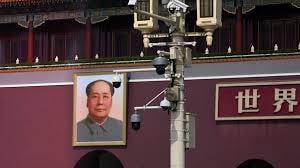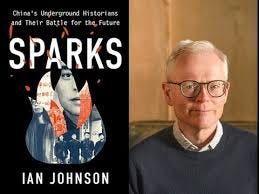Notes
To Not Fall Nor Stumble Upon : Mainland China.
SPARKS – China’s Underground Historians and Their Battle for the Future, by Ian Johnson (2023, Oxford University Press, 368 pages).
Since we were all children, then in secondary school and thereafter, there have been books about China – P.R.C. in the 1950’s and 1960’s, the era of the Great Leap Forward and later on the subject of the Cultural Revolution. This body of literature might even be considered a genre of non – fiction given there is so much to be said about China at the time (mention 1911 – 1949 and after) and people do try to portray the Cultural Revolution there for the destructive period that it was, and that this degenerate destruction is in the collective mindset of the Western commonweal is not unreasonable. In China during the 1950’s and 1960’s, Chinese people were deliberately and many times purposelessly sent away from their homes, many of whom had domiciled in and built up their existence over generations in places on the mainland; into the countryside and to far – removed locations to break ties with the past and tradition, and in line with other CCP edicts, and many, many of these perished. They perished in primitive and isolated living conditions characterized by human abuses, or abuses of the regime, as this “revolution” in banishing and starving people was the way Chinese bureaucrats and officials at the time proved their nationalism and attachment to the communist party. The Chinese Premier also had to be kept happy, ruthless and totalitarian as he was, and a genius and garnering political support for his policies no matter how haywire. In short, and greatly simplified, the Cultural Revolution for China was generally haywire and set back the country perhaps to the beginning of the industrial revolution in important places, called for increased international isolation of the regime, and decimated its intellectuals among other things. Additionally, the country was set back, again, decades economically; though it can be mentioned in contrary reply that the regime maintained its political and party control over the nation and its place in history in the 20th century as a nation – state, in fact a region, altogether and by design late in its arrival at modernism and stuck between the old world and the industrial – technological and post – industrial new one.
Ian Johnson has set down before the reader this carefully composed and very well - written book that should be treated attentively given its rich detail in illustrating the ways, not just in single fashion, but the multiple ways the newer regimes in mainland China have sought to recast the Cultural Revolution as a time of preparation to take over, or at least to make efforts to greatly expand the sphere of influence of Chinese communism, in every way possible. A large part of that was apparently then taken up in purging people who had a thought, values, judgment and who were influenced themselves by Western democratic ideas and institutions, at the time entirely foreign to the regime and vilified as the enemy of socialism and especially of Chinese communism. Traveling abroad often provoked the worst as despite one’s party affiliation and conforming conduct, the risks of it were horrendous and with grave consequences that could arise from the authorities at any time.
The book itself by its entire content – each chapter can be seen as a separate entity – whether from verbal – oral history, video interviews and programs, or dissenting literature and so on – highlights the tearing of the fabric of Asian society provoked by the Cultural Revolution, Mao Zedong thought and internal rightist versus leftist communist conflicts within the regime and more. This is a must read for people making up their mind politically about the Chinese mainland and its economic and administrative system. The P.R.C. by its mainland and cultural milieu, and with its potentialities to develop into a freer country has been for a long time and remains a huge subject. Much of this has to do with how Chinese culture, politics and other aspects of life on the mainland, within China, determine ways China holds itself out to the world. Indeed, the text at hand is full of the very rich litany of unfortunate events, happenings, and completely unnecessary demise of millions captured in its pages with a small exemplary of these presented to focus upon and to encompass the consequences of the power of modern Chinese civilization, and the monstrous and patently destructive effects on Chinese people, establishments and institutions of those among its founders at the very top of its regimes.


Dive into your interests
We'll recommend top publications based on the topics you select.
